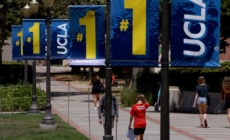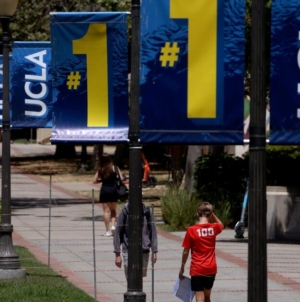-
Last Night in Baseball: Can Anyone Stop The Brewers? - 3 mins ago
-
Disney’s ESPN announces major deals with NFL, WWE, as entertainment company’s profits soar - 6 mins ago
-
Neighbor Throws Cigarette From Upstairs, Outrage Over What It Ruins Below - 19 mins ago
-
UC says Trump’s grant suspensions at UCLA total $584 million, a ‘death knell’ for research - 28 mins ago
-
Sediment Removal Becomes Growing Challenge at Lake Balaton - 29 mins ago
-
Kelley Mack of ‘The Walking Dead’ and ‘9-1-1’ dies at age 33 from cancer - 40 mins ago
-
American hiker who went missing on Norwegian glacier rescued - 42 mins ago
-
Hulu and Disney+ will be combined into one app, Disney says - 45 mins ago
-
NY Giants Legend Surprises Jaxson Dart with Personal Note - 58 mins ago
-
Gypsy Orchestra Celebrates Anniversary with Gala Concert - about 1 hour ago
UC must reconsider ban on campus jobs for undocumented students
In a key win for immigrant rights organizations, a California Court of Appeal ruled that the University of California has not provided sufficient legal grounds to justify its “discriminatory policy” barring the hiring of undocumented students from on-campus jobs.
A UCLA alumnus and a lecturer filed a lawsuit in October arguing that the UC system’s hiring policy violates state law because it discriminates against students based on their immigration status.
Plaintiffs said that, without access to campus jobs, many undocumented students struggle to meet tuition costs and cover basic needs such as housing and food. These students are often forced into the underground economy and miss out on career-advancing opportunities such as research assistant positions.
Attorneys representing the UC system argued that its policy is justified because hiring undocumented students could run afoul of a federal law that bans the hiring of people without legal status and may provoke retaliation from the federal government.
A three-judge panel, however, ruled that the system’s policy violates California’s Fair Employment and Housing Act and that fear of federal litigation is not sufficient grounds to uphold it.
“The University does not assert that it relied on the requirements of a federal statute or regulation in deciding to not to amend its policy — only on the risks associated with adopting a policy that the federal government might consider unlawful,” states the ruling. “Accordingly, we conclude that the University abused its discretion by relying on an improper justification for continued application of its facially discriminatory policy.”
The panel stopped short of ruling that UC must overturn its policy; rather, it ordered that the university system reconsider the policy based on proper legal criteria.
Attorneys representing the plaintiffs consider the ruling a victory and are calling on UC to open jobs to undocumented students.
“The court’s powerful opinion rejects the UC’s attempt to justify its policy discriminating against undocumented students. It is wrong — both morally and legally — to bar our state’s most talented students from access to crucial educational employment opportunities based on their immigration status,” said Ahilan Arulanantham, co-director of UCLA’s Center for Immigration Law and Policy in a statement. “We call on the UC to comply with state law and treat all its students equally, regardless of immigration status.”
The UC system said it is reviewing the court’s ruling but has not commented on whether it will change its hiring policy.
“To the extent it’s compliant with the law, the University continues to believe undocumented students deserve the same opportunities as our other student,” said UC spokesperson Stett Holbrook in a statement.
University officials have previously expressed fear that changing the system’s hiring policy could result in civil fines, criminal penalties and the potential loss of billions of dollars in federal funding. Last week, the Trump administration announced it was freezing hundreds of millions of dollars in federal research funding to UCLA, citing concerns over antisemitism and the university’s handling of pro-Palestinian protests.
Tuesday’s court ruling comes after a years-long push to open campus jobs to students lacking documentation.
The debate over whether it is legal to do so revolves around the Immigration Reform and Control Act of 1986, which bars the hiring of people without legal status.
The plaintiffs in the lawsuit argue that this federal law does not apply to government employers such as the UC system. Attorneys representing UC did not argue that the IRCA applies to public universities but said that the federal government might believe it does.
In Tuesday’s ruling, the three-judge panel noted that UC had the option to file a lawsuit against the federal government to secure a court ruling on whether the university system is subject to the IRCA.
Under the Obama-era Deferred Action for Childhood Arrivals policy — better known as DACA — undocumented youth who were brought to the United States as children could get work permits. The UC system does allow the hiring of undocumented students with work authorization.
President Trump, however, terminated the DACA program in 2017, and although courts have challenged that decision, the program is no longer accepting new applicants.
There are now around 64,300 undocumented college students who are not eligible for DACA in California and, therefore, not eligible for work authorization — or campus jobs.
“As someone who was undocumented and a UC lecturer, I know firsthand the transformative power of on-campus work opportunities,” said plaintiff Iliana G. Perez in a statement on the court ruling. “UC must now act with urgency to dismantle exclusionary policies and ensure all students, regardless of immigration status, can fully participate in their education, contribute to their campuses, and shape California’s future.”
Students and faculty began advocating for the UC system to open jobs to all students regardless of their immigration status in 2022.
The UC regents established a working group to consider change its hiring policy in 2023, but the group suspended its work due to fear that doing so would violate the IRCA.
A year later, the California Legislature passed the Opportunity for All Act, requiring state public universities to open up employment to all students, but Newsom vetoed the bill, citing legal concerns over the IRCA.
This prompted the plaintiffs to file their lawsuit in October 2024 seeking a writ of mandate requiring the UC system to consider undocumented students for on-campus jobs. A court initially denied this request, but the plaintiffs appealed the decision to the California Supreme Court, which then ordered the state Court of Appeal to rule on the merits of the case. The Court of Appeal heard oral arguments in May and issued its ruling Tuesday.
Source link































